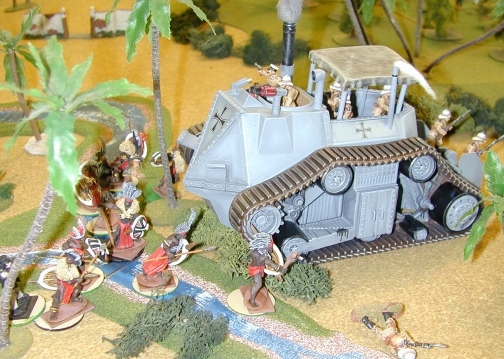
The
battle of Dorodoom pass
Our long column set out
from the coast early in the morning of January 17, 1880. After traveling for six days covering almost 300 mi. we made
camp and were joined in the morning by a long column of Imperial Prussian troops.
Among the many troops was one of the Kaiser's new MARK IV land ships!
Quite a sight, very impressive, one can only hope that it does all that
the Prussian aristocrat Col. von Stopengoof says it is capable of. During the first night of our combined encampment the crews
of several of the German vehicles including the MARK IV land ship played a lively game of
soccer with the crews of several of the British steam spiders.
It was a rare sight indeed to see these men so used to being on opposite
sides of the battlefield laughing and joking, drinking and smoking as if they
were brothers. Truly war makes
strange bedfellows!
After being encamped for
two days while orders of march were issued and the commanders of the different
imperial forces discussed their battle plans and issued orders we moved out in a
long column towards destiny and Dorodoom! It
was at this point after wonderful brunch of Bratwurst, sauerkraut, and potato
pancakes, liberally doused with several pints of German beer I was invited to
spend the day riding with the Prussian section of the left column.
The British column paralleled us on the right separated by only a couple
hundred meters.

It was at this point that the serene quiet of this beautiful pass was split asunder with the screams of native warriors and immediately to our front dozens of them emerged from the thick brush and swarmed around the Prussian Mark VI land ship. I spurred my horse up onto a hill on the column's right for safety and a better view since I was a noncombatant and only armed with a pistol for my personal protection. As I reach the top of a hill I could hear and see the British column about 100 yd. to my right crossing over this small hill and descending into the pass whose bottom contained a small river. My eyes returned to the head of the Prussian column where a dozen or so natives threw spears and fired arrows at the Mark VI. It carried no heavy offensive armament and I am told was mainly constructed to safely transport troops and provide a firing platform for those troops. I was assured that a heavier version is currently being built in Germany. The Prussian shutztruppen under the command of Captain von Luck and accompanied by Col. Stopengoof returned fire dropping several of the natives. The natives fire however was not without effect, one shutztruppen with a spear threw his neck fell to the ground.